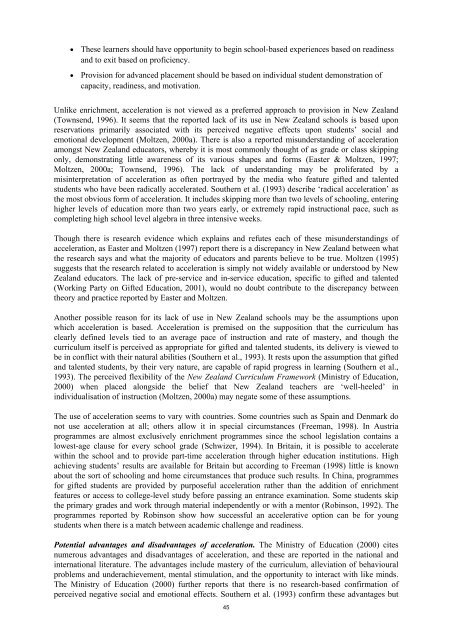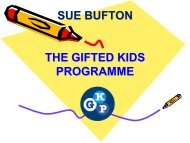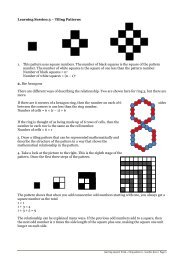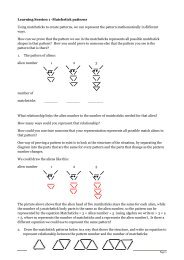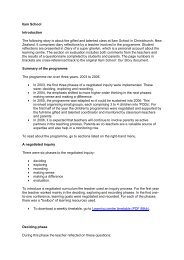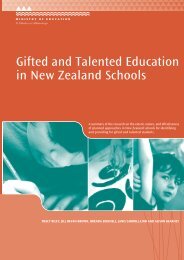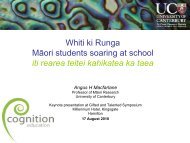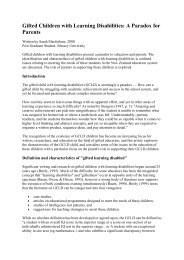The Extent, Nature and Effectiveness of Planned Approaches in ...
The Extent, Nature and Effectiveness of Planned Approaches in ...
The Extent, Nature and Effectiveness of Planned Approaches in ...
Create successful ePaper yourself
Turn your PDF publications into a flip-book with our unique Google optimized e-Paper software.
• <strong>The</strong>se learners should have opportunity to beg<strong>in</strong> school-based experiences based on read<strong>in</strong>ess<strong>and</strong> to exit based on pr<strong>of</strong>iciency.• Provision for advanced placement should be based on <strong>in</strong>dividual student demonstration <strong>of</strong>capacity, read<strong>in</strong>ess, <strong>and</strong> motivation.Unlike enrichment, acceleration is not viewed as a preferred approach to provision <strong>in</strong> New Zeal<strong>and</strong>(Townsend, 1996). It seems that the reported lack <strong>of</strong> its use <strong>in</strong> New Zeal<strong>and</strong> schools is based uponreservations primarily associated with its perceived negative effects upon students’ social <strong>and</strong>emotional development (Moltzen, 2000a). <strong>The</strong>re is also a reported misunderst<strong>and</strong><strong>in</strong>g <strong>of</strong> accelerationamongst New Zeal<strong>and</strong> educators, whereby it is most commonly thought <strong>of</strong> as grade or class skipp<strong>in</strong>gonly, demonstrat<strong>in</strong>g little awareness <strong>of</strong> its various shapes <strong>and</strong> forms (Easter & Moltzen, 1997;Moltzen, 2000a; Townsend, 1996). <strong>The</strong> lack <strong>of</strong> underst<strong>and</strong><strong>in</strong>g may be proliferated by amis<strong>in</strong>terpretation <strong>of</strong> acceleration as <strong>of</strong>ten portrayed by the media who feature gifted <strong>and</strong> talentedstudents who have been radically accelerated. Southern et al. (1993) describe ‘radical acceleration’ asthe most obvious form <strong>of</strong> acceleration. It <strong>in</strong>cludes skipp<strong>in</strong>g more than two levels <strong>of</strong> school<strong>in</strong>g, enter<strong>in</strong>ghigher levels <strong>of</strong> education more than two years early, or extremely rapid <strong>in</strong>structional pace, such ascomplet<strong>in</strong>g high school level algebra <strong>in</strong> three <strong>in</strong>tensive weeks.Though there is research evidence which expla<strong>in</strong>s <strong>and</strong> refutes each <strong>of</strong> these misunderst<strong>and</strong><strong>in</strong>gs <strong>of</strong>acceleration, as Easter <strong>and</strong> Moltzen (1997) report there is a discrepancy <strong>in</strong> New Zeal<strong>and</strong> between whatthe research says <strong>and</strong> what the majority <strong>of</strong> educators <strong>and</strong> parents believe to be true. Moltzen (1995)suggests that the research related to acceleration is simply not widely available or understood by NewZeal<strong>and</strong> educators. <strong>The</strong> lack <strong>of</strong> pre-service <strong>and</strong> <strong>in</strong>-service education, specific to gifted <strong>and</strong> talented(Work<strong>in</strong>g Party on Gifted Education, 2001), would no doubt contribute to the discrepancy betweentheory <strong>and</strong> practice reported by Easter <strong>and</strong> Moltzen.Another possible reason for its lack <strong>of</strong> use <strong>in</strong> New Zeal<strong>and</strong> schools may be the assumptions uponwhich acceleration is based. Acceleration is premised on the supposition that the curriculum hasclearly def<strong>in</strong>ed levels tied to an average pace <strong>of</strong> <strong>in</strong>struction <strong>and</strong> rate <strong>of</strong> mastery, <strong>and</strong> though thecurriculum itself is perceived as appropriate for gifted <strong>and</strong> talented students, its delivery is viewed tobe <strong>in</strong> conflict with their natural abilities (Southern et al., 1993). It rests upon the assumption that gifted<strong>and</strong> talented students, by their very nature, are capable <strong>of</strong> rapid progress <strong>in</strong> learn<strong>in</strong>g (Southern et al.,1993). <strong>The</strong> perceived flexibility <strong>of</strong> the New Zeal<strong>and</strong> Curriculum Framework (M<strong>in</strong>istry <strong>of</strong> Education,2000) when placed alongside the belief that New Zeal<strong>and</strong> teachers are ‘well-heeled’ <strong>in</strong><strong>in</strong>dividualisation <strong>of</strong> <strong>in</strong>struction (Moltzen, 2000a) may negate some <strong>of</strong> these assumptions.<strong>The</strong> use <strong>of</strong> acceleration seems to vary with countries. Some countries such as Spa<strong>in</strong> <strong>and</strong> Denmark donot use acceleration at all; others allow it <strong>in</strong> special circumstances (Freeman, 1998). In Austriaprogrammes are almost exclusively enrichment programmes s<strong>in</strong>ce the school legislation conta<strong>in</strong>s alowest-age clause for every school grade (Schwizer, 1994). In Brita<strong>in</strong>, it is possible to acceleratewith<strong>in</strong> the school <strong>and</strong> to provide part-time acceleration through higher education <strong>in</strong>stitutions. Highachiev<strong>in</strong>g students’ results are available for Brita<strong>in</strong> but accord<strong>in</strong>g to Freeman (1998) little is knownabout the sort <strong>of</strong> school<strong>in</strong>g <strong>and</strong> home circumstances that produce such results. In Ch<strong>in</strong>a, programmesfor gifted students are provided by purposeful acceleration rather than the addition <strong>of</strong> enrichmentfeatures or access to college-level study before pass<strong>in</strong>g an entrance exam<strong>in</strong>ation. Some students skipthe primary grades <strong>and</strong> work through material <strong>in</strong>dependently or with a mentor (Rob<strong>in</strong>son, 1992). <strong>The</strong>programmes reported by Rob<strong>in</strong>son show how successful an accelerative option can be for youngstudents when there is a match between academic challenge <strong>and</strong> read<strong>in</strong>ess.Potential advantages <strong>and</strong> disadvantages <strong>of</strong> acceleration. <strong>The</strong> M<strong>in</strong>istry <strong>of</strong> Education (2000) citesnumerous advantages <strong>and</strong> disadvantages <strong>of</strong> acceleration, <strong>and</strong> these are reported <strong>in</strong> the national <strong>and</strong><strong>in</strong>ternational literature. <strong>The</strong> advantages <strong>in</strong>clude mastery <strong>of</strong> the curriculum, alleviation <strong>of</strong> behaviouralproblems <strong>and</strong> underachievement, mental stimulation, <strong>and</strong> the opportunity to <strong>in</strong>teract with like m<strong>in</strong>ds.<strong>The</strong> M<strong>in</strong>istry <strong>of</strong> Education (2000) further reports that there is no research-based confirmation <strong>of</strong>perceived negative social <strong>and</strong> emotional effects. Southern et al. (1993) confirm these advantages but45


